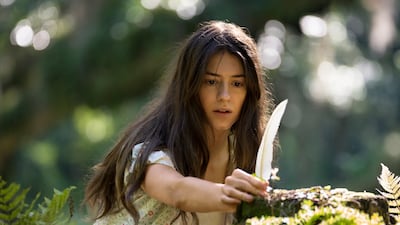Ahead of its release, the buzz surrounding Where the Crawdads Sing was as loud as the birds circling the film’s swampy marshland setting.
Unfortunately, this anticipated drama only treads water.
Adapted from the 2018 novel by Delia Jones, a runaway hit with more than 15 million copies sold, expectations were high due to the talent involved.
It is produced by Hello Sunshine, a company founded by Oscar-winning actress Reese Witherspoon, with a mission to place “women at the centre of every story we create, celebrate and discover".
The director is Olivia Newman, who announced herself with the impressive 2018 wrestling drama First Match. Taylor Swift also wrote an original song, Carolina, for the film.
Meanwhile on the screen, British actress Daisy Edgar-Jones leads a solid cast of fresh and seasoned talent, including Harris Dickinson and David Strathairn.
But despite all of the creative firepower involved, the effort in turning the atmospheric and powerful novel into an arresting cinematic experience has been left wanting.
A key reason is it doesn't know what story it wants to tell — a trap screen adaptations often fall into when taking on multilayered novels.
Lack of nuance and characterisation
Primarily set within a two-decade period beginning from the early 1950s, the film follows the life of Catherine "Kya" Clarke as she grows up amid the swamps of the North Carolina marshlands.
To say her upbringing is challenging is an understatement.
Living just above the poverty line with an alcoholic and abusive father, Kya lives a solitary life in the family home and is shunned by the townspeople.
It is an arrangement that also suits her.
Disdaining to the bustle and gossip of the crowds, she instead forges her connection with the birds and botanical life of the marshlands.
That existence is shattered with the death of Chase Andrews, a young personality from a respected family.
With the body found under mysterious circumstances near Kya's home, the ire of an already suspicious town is aimed at her. Before long she is charged with murder and fighting for her life in court.

This is all swiftly set up within the opening 15 minutes of the film, thus positioning the narrative as a promising legal thriller.
However, once the film ditches the linear format of the book and flashes back and forth between the past and present, it seriously begins to lose shape and focus.
Where the book allowed us to see the evolution of Kya’s character, from the silent barefooted child to a strong, passionate and determined adult, we are instead treated to an abridged version of that growth.
As a result, nuanced characterisation and some of the issues raised by the novel are diluted or lost.
Kya’s transition from being illiterate to being able to read and publish books in a relative short period defies comprehension.
Her torrid relationships with the aforementioned Andrews and Tate Walker (Taylor John Smith) are treated with a lack of subtlety that leaves the film resembling a southern state version of The Notebook at various times.

All of this would have been acceptable if the film stayed true to the bigger picture.
In the early court scenes, Kya’s lawyer, Tom Milton (Strathairn) frames the case as a stress test of society’s ability to deliver justice to the marginalised.
However, the film doesn’t delve into the social fault lines defining that period.
The economic marginalisation faced by marshland families, which in Kya’s case contributed to the domestic violence at home, is glossed over.
Meanwhile the racism inherent within that era in the American deep south is acknowledged with a throwaway comment.
The end result is a whiplash of a viewing experience.
The tonal incoherence made me feel like I was watching different films at once, while the surface level depth of the screenplay by Lucy Alibar left me mostly disinterested by the time the payoff comes at the end.
Strong performances
That said, kudos to a cast who did the best with the material offered.
Expect Edgar-Jones to go onto bigger and greater things, not to mention award nominations, for her committed performance.
Strathairn channels his inner Atticus Finch with a stately turn as the lawyer Milton, while the simmering malevolence behind Dickinson’s portrayal of Andrews gives the film a sorely needed edge.
Where the Crawdads Sing whimpers where it should have soared.





















